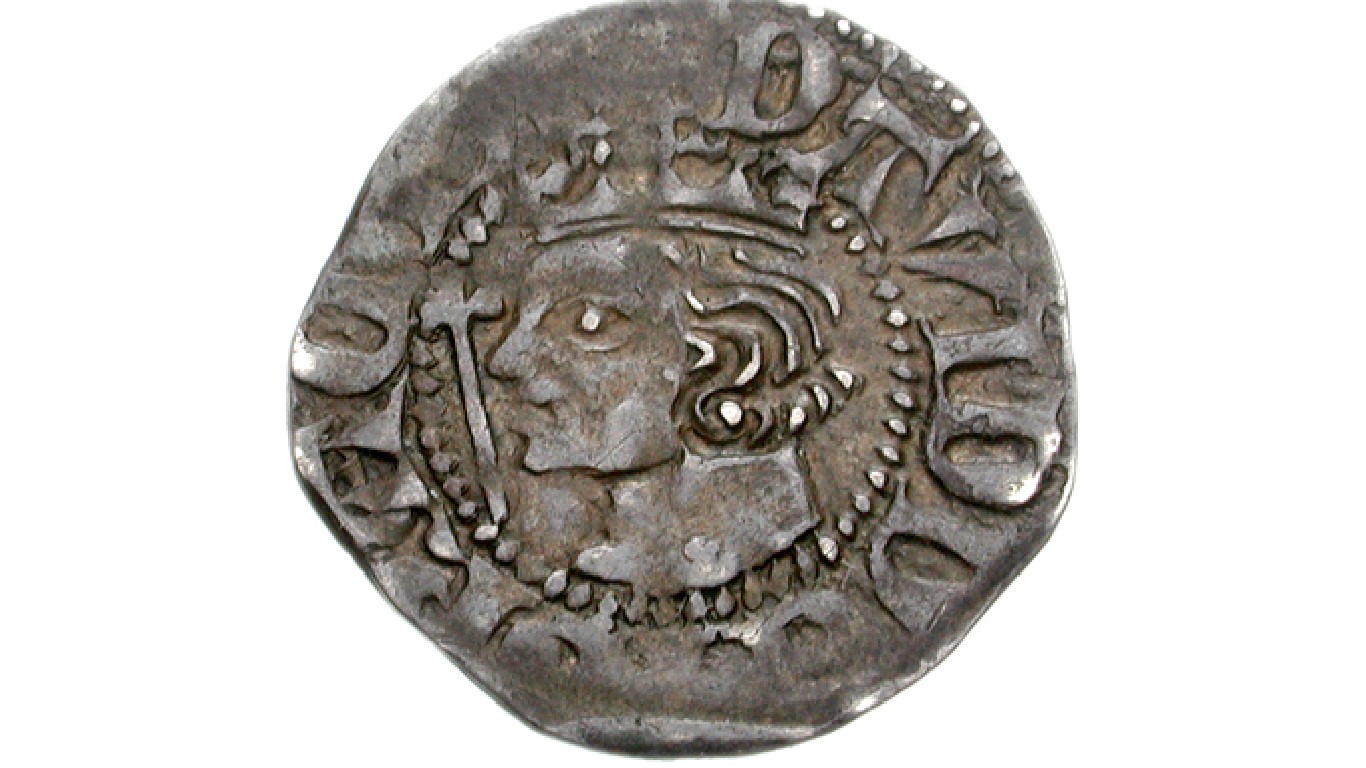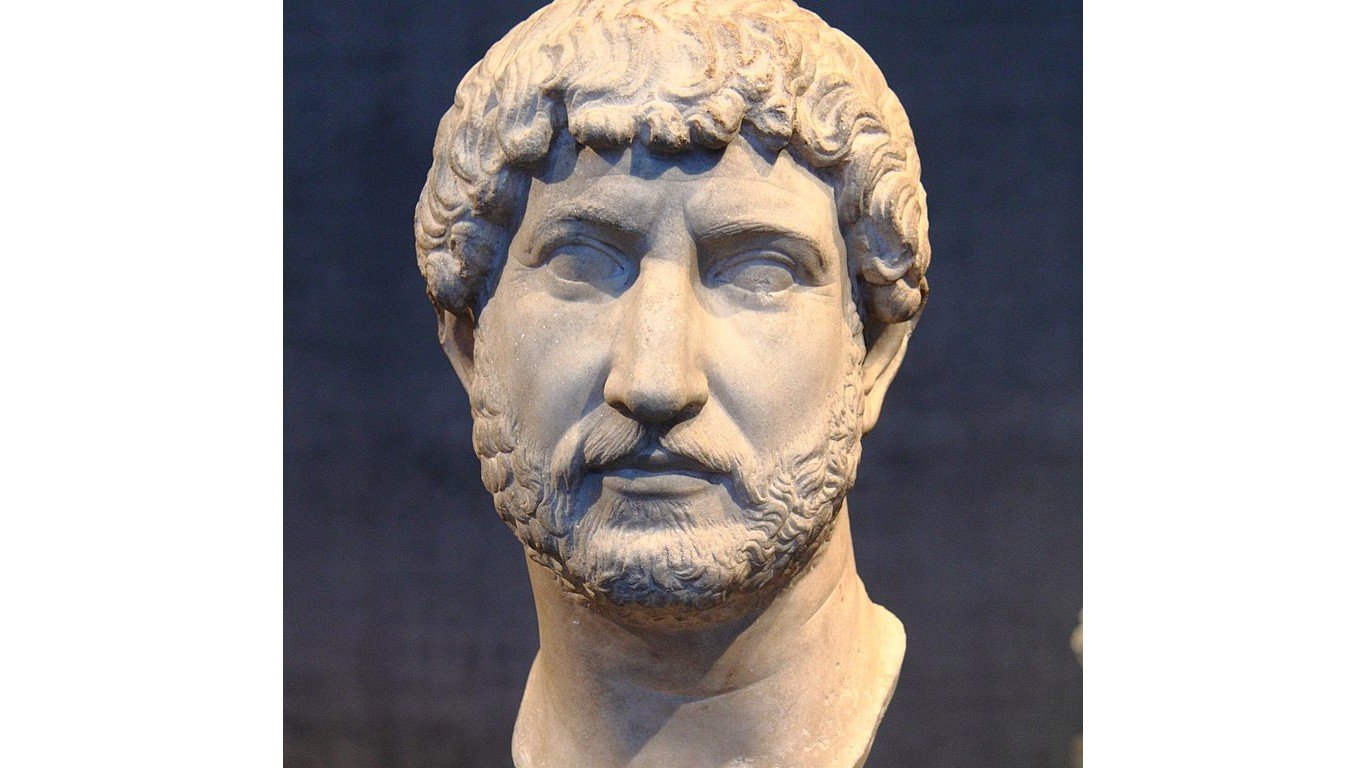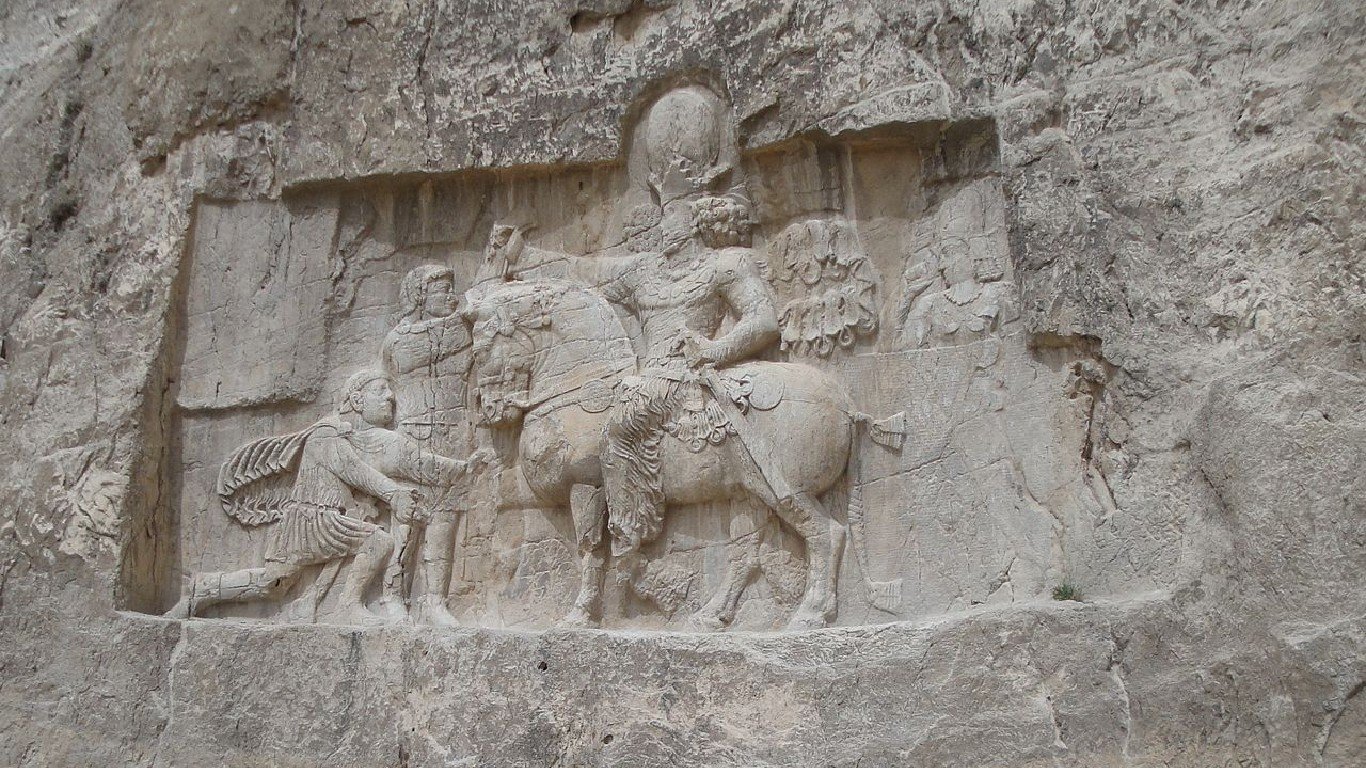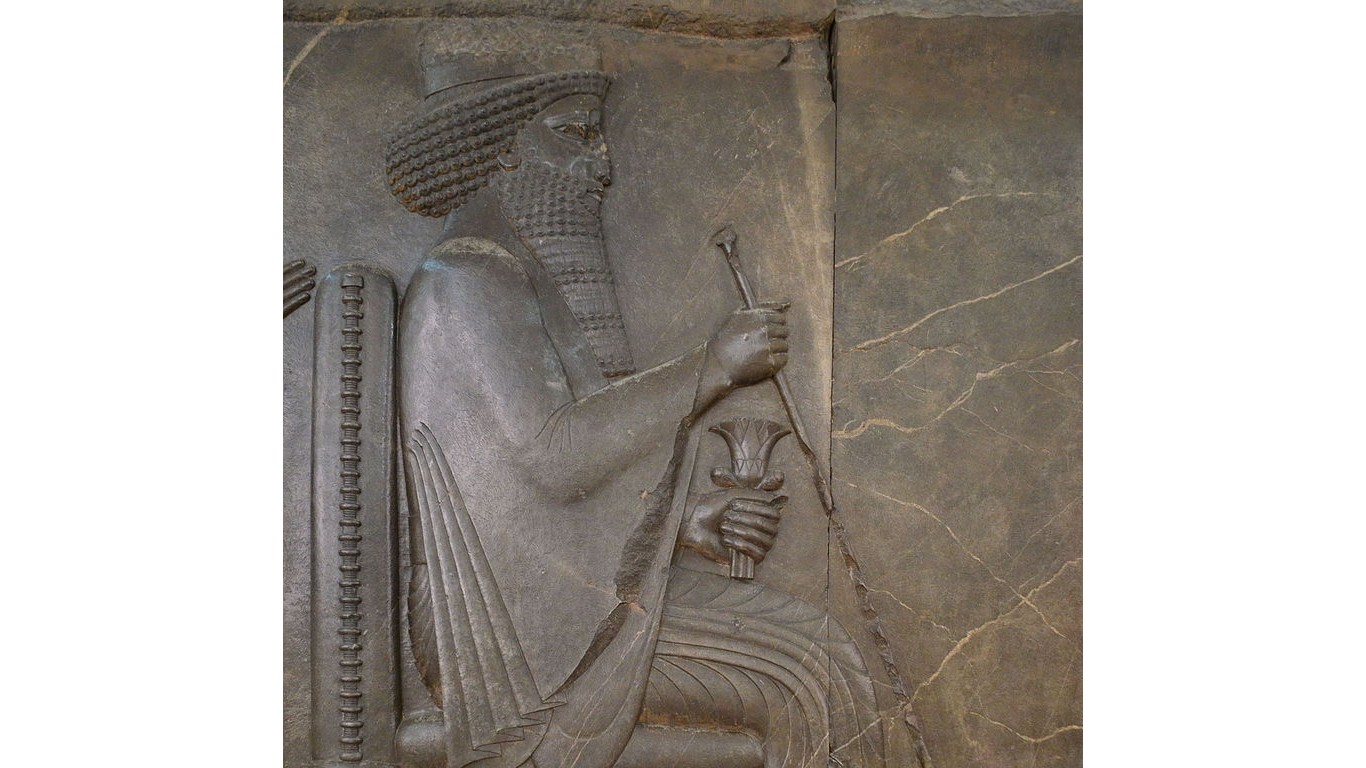From our vantage point in the 21st century, it might seem incredible that the leader of a nation would place himself or herself in harm’s way in a battle. But what seems unbelievable now was commonly required of sovereigns from the beginning of written history until around the mid-18th century. (These sovereigns sometimes proved to be among the most legendary warriors in history.)
To find the kings – including emperors, sultans, and other supreme heads of state – who led their own armies, 24/7 Tempo used resources such as Britannica, History Collection, New World Encyclopedia, World History, and Royal.UK, the official website of the British royal family. The degree of each monarch’s participation in actual hand-to-hand fighting varies. In some cases, the kings were literally in the thick of battle; in others, they were more likely to be present in a supervisory or inspirational capacity. The battles listed are not necessarily the only ones these men engaged in.
Monarchs, whose power was often derived from their direct command of the military, took part in conflicts because the troops they led needed a flesh-and-blood reason to fight. Sovereigns had to demonstrate their courage and their presence served as a rallying point, and if they had a reputation for military skill, that would help build troops’ confidence in combat. In addition, soldiers often believed that they would be rewarded by their monarch if he saw them demonstrating bravery in battle, so would be motivated to fight harder.
This began to change with the advent of firearms, which put sovereigns in greater peril on the battlefield. Another factor was the increased professionalization of the militaries, as officer corps were created and their ranks were populated based on merit, at least in theory.
By the 18th century, too, succession in the royal houses of Europe had become more stable, and some nations evolved into constitutional monarchies where the sovereign’s role would be circumscribed. (These are the 20 longest reigning monarchs in history.)
With the notable exception of Napoleon Bonaparte, by the early 19th century, the days of a king at the head of an army marching across the landscape were over. The culture had changed as well, as nations expected their leaders to be competent at governing and leave the business of war to the generals.

King George II
> Nation: Great Britain
> Conflict(s) Battle of Dettingen
> When: 1743
George II, at the age of 60, was the last British monarch to fight alongside his soldiers, leading them in a coalition with Hanoverian and Austrian soldiers against the French at the Battle of Dettingen in 1743 in what is now Germany. George, from the House of Hanover, was the last British monarch not born in England.

Emperor Napoleon III
> Nation: France
> Conflict(s) Franco-Prussian War
> When: 1870
France went to war with Prussia and other German states in 1870. The Prussians and their allies won a series of victories over the French, who were ill-prepared for war. The French army at Sedan led by Napoleon III was surrounded and the monarch was taken prisoner. His capture effectively ended the Second Empire, which was replaced by the Third Republic. Napoleon III was kept captive in a castle in Westphalia and then went to England in exile where he died in 1873.

Emperor Otto II
> Nation: Holy Roman Empire
> Conflict(s) Battle of Stilo
> When: 982
The Holy Roman Emperor Otto II led a mostly German army against the Muslim rulers of Sicily in 982 at the Battle of Stilo. After initial success that almost broke the Muslim center, and the death of the Muslim emir, the Muslims rallied, surrounding the European army and almost wiping it out. Otto II escaped aboard a Greek merchant ship.
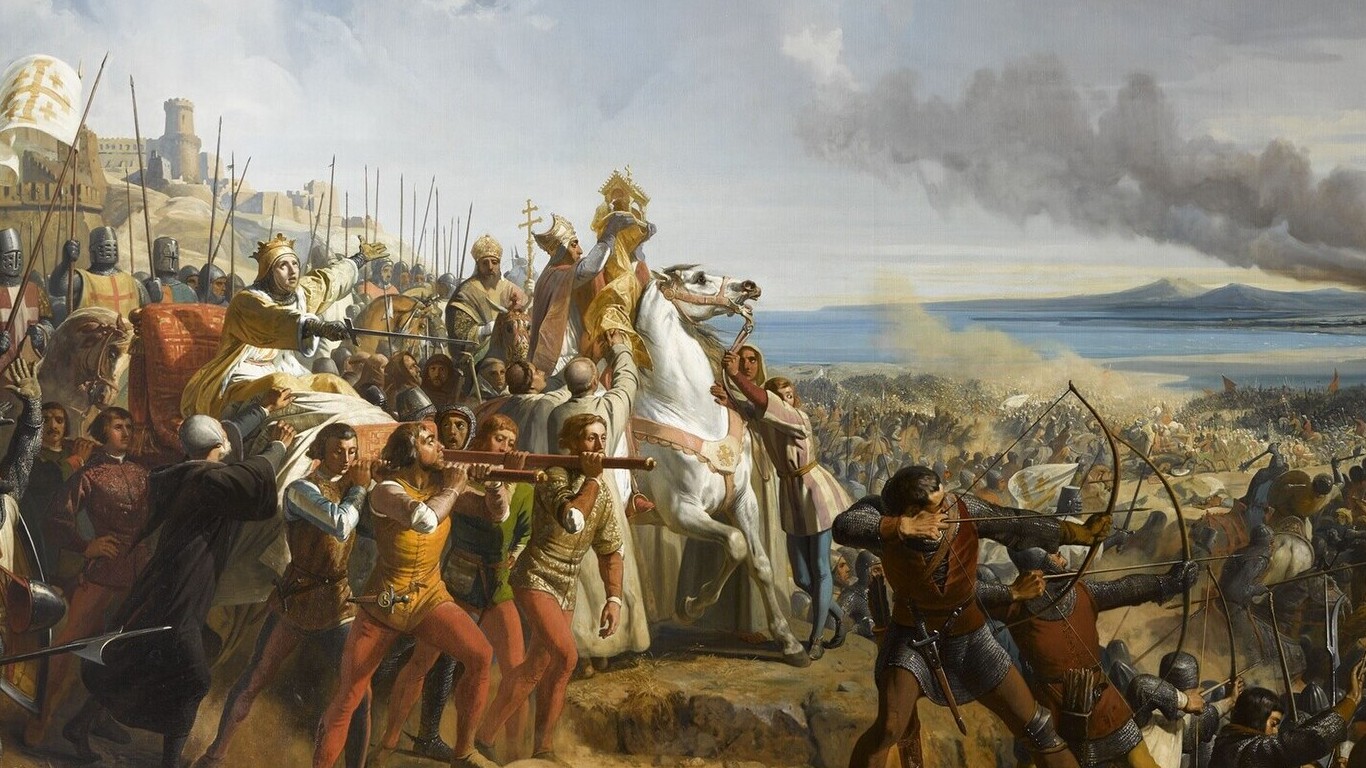
King Baldwin IV
> Nation: Kingdom of Jerusalem
> Conflict(s) Battles with Saladin
> When: 1176-1185
King Baldwin IV was afflicted by leprosy during his brief life (he died at 24), but he learned to ride and fight despite blindness and the inability to use his hands and feet. Baldwin’s reign would be marked by his continuous efforts to defend his Christian kingdom against Saladin, the renowned Muslim military leader who was sultan of Egypt and Syria. He defeated the famed Muslim leader at the Battle of Montgisard in 1177 but Saladin returned again and again, finally destroying the remains of Baldwin’s kingdom in 1187.
Emperor Frederick Barbarossa
> Nation: Holy Roman Empire
> Conflict(s) Various
> When: 1155-1190
Frederick Barbarossa, who holds a special place in German history, challenged the Vatican and sought to create German hegemony in Western Europe. He fought a nearly 30-year war with the Italian city-states, leading six expeditions into the Italian peninsula before emerging victorious. He was also co-leader of the Third Crusade, setting out for the Holy Land in 1189. He never reached his goal, drowning in the Saleph River in what is now Turkey in 1190.

Sultan Saladin
> Nation: Egypt and Syria
> Conflict(s) Various
> When: 1164-1193
Saladian combined well-developed diplomatic ability, commitment to holy war, and resolute military force to become one the Muslim world’s greatest heroes. He fought against the Crusaders for years, capturing Jerusalem – which had been in the possession of the Franks for almost 90 years – in 1187, signaling the beginning of the end for Christian forces in the region, and fought Richard the Lionheart to a standstill in the Third Crusade.
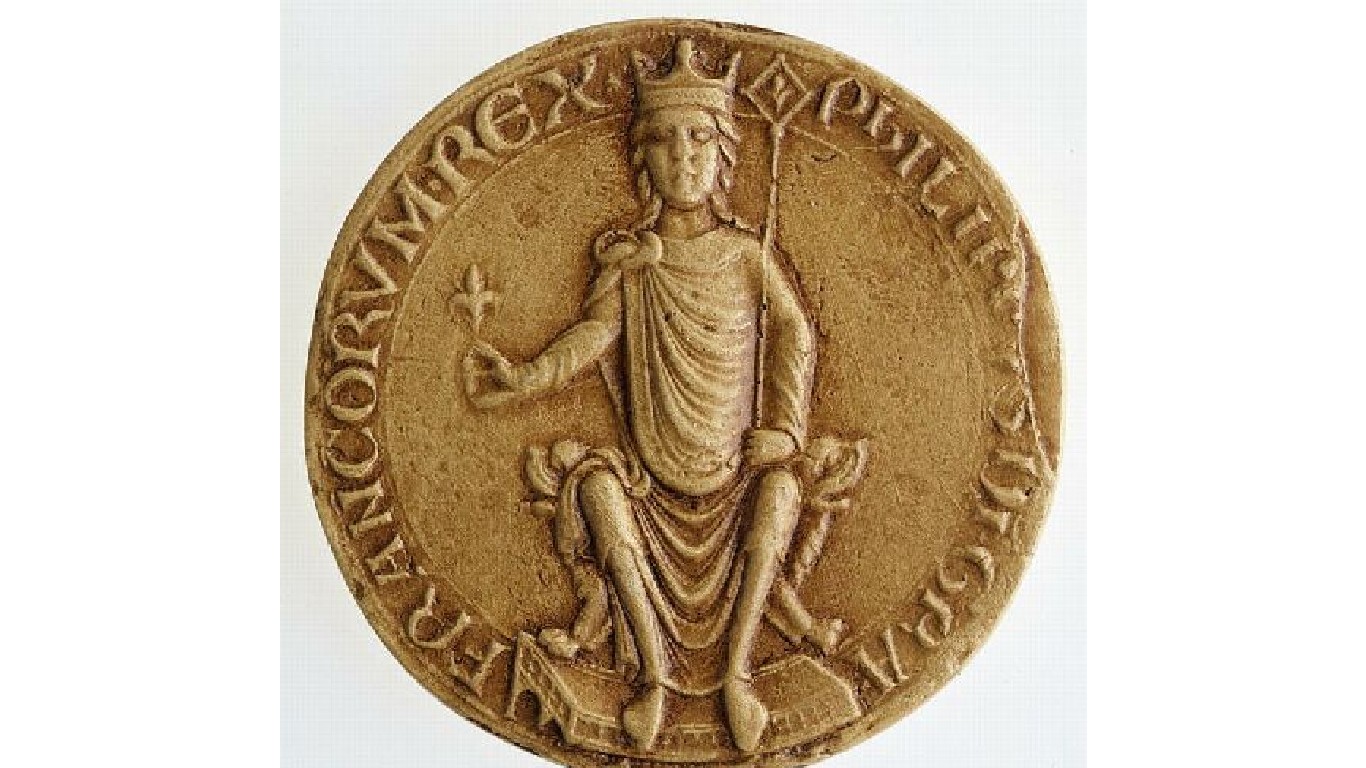
King Philip II
> Nation: France
> Conflict(s) Various
> When: 1181-1214
King Phillip II fought against rebellious vassal states, waged war on Henry II of England, and was a co-leader of the Third Crusade, but his greatest battlefield victory was at the Battle of Bouvines in 1214 which is now far northern France, on the Belgian border. Philip II defeated a coalition of forces that included the Holy Roman Empire, England, and other allies. The triumph greatly increased the prestige of the French monarchy.

Khan Tamerlane
> Nation: Timurid Empire
> Conflict(s) Various
> When: 1360-1405
Khan Tamerlane, also known as Timur, was infamous for his barbaric campaigns in Central Asia and what are today’s Lebanon, Syria, and Iraq. He also led his armies on a series of conquests in India (capturing the Persian city of Herāt en route), Russia (he occupied Moscow), and Egypt. Tamerlane planned an expedition to China but died during the journey in what is today central Kazakhstan.

Sultan Bayezid I
> Nation: Ottoman Empire
> Conflict(s) Various
> When: 1389-1402
Founder of the centralized Ottoman Empire, Sultan Bayezid I defeated Christian armies arrayed against him at Kosovo and Nicopolis, and extended the Ottoman Empire into the Balkans. When he tried to broaden the empire’s control over the Turkish-Muslim rulers in Anatolia, Bayezid came into conflict with Tamerlane, who defeated him at the Battle of Ankara in 1402, resulting in the Ottoman’s capture and eventual death in captivity..

King Henry V
> Nation: England
> Conflict(s) Lancastrian War
> When: 1415-1422
King Henry V is regarded by many historians as England’s greatest warrior king. He made his reputation fighting the French during the Lancastrian War, the last phase of the so-called Hundred Years’s War, and was responsible for one of England’s most famous victories – at the Battle of Agincourt in 1415. Henry’s diplomatic acumen neutralized potential foes such as the Duke of Burgundy, and he demonstrated a knowledge of sea power not understood by many monarchs of his time by preventing naval assistance to the French.

Emperor Ming Taizu
> Nation: China
> Conflict(s) Various
> When: 1368
Before he became Emperor Ming Taizu (also known as the Hongwu Emperor), Zhu Yuanzhang led forces that conquered China and ended the Yuan Dynasty, forcing the Mongols to retreat to the Central Asian steppe. The victory allowed him to proclaim himself emperor and establish the Ming Dynasty, which lasted from 1368 to 1644, making it the longest dynasty in Chinese history. He also built a navy of more than 300 ships.

King Edward II
> Nation: England
> Conflict(s) Battle of Bannockburn
> When: 1314
Much of King Edward II’s reign involved trying to assert his authority over the English aristocracy. He conducted a losing campaign against Scotland in the Battle of Bannockburn, which became one of Scotland’s greatest military victories and briefly established Scottish independence.
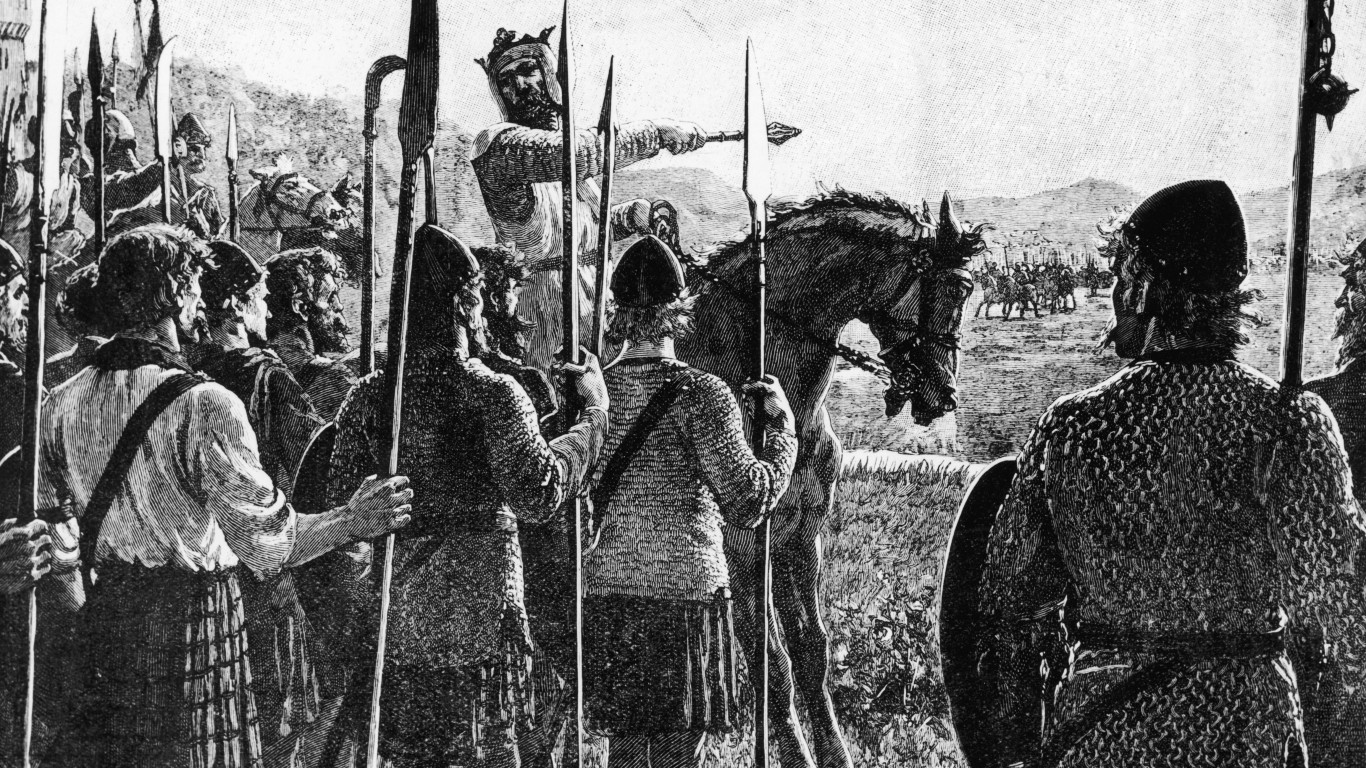
King Robert I
> Nation: Scotland
> Conflict(s) Various
> When: 1314
King Robert I, also known as Robert the Bruce, led Scotland to its greatest victory at the Battle of Bannockburn in 1314. The battle affirmed the independence of Scotland. Success did not come easy for Robert I. He was beaten twice on the battlefield by the English in 1306 and three of his brothers were executed. Robert was forced to live in exile on a remote island north of the Irish coast before he returned to Scotland and patiently built a force that eventually defeated the English.

King John II
> Nation: France
> Conflict(s) Battle of Poitiers
> When: 1356
Leading French forces against the English at the Battle of Poitiers in 1356, King John II, also known as Jean le Bon (John the Good), was defeated by the army of the Prince of Wales. Taken to London as a captive, he had to sign treaties that proved disastrous for his nation. Though he had gained a reputation for reneging on agreements, truces, and even the dowry for his daughter, he proved to be an honorable man: The English released him, keeping his son hostage in his place; when the son escaped, John voluntarily returned to captivity.
King David II
> Nation: Scotland
> Conflict(s) Battle of Neville’s Cross
> When: 1346
King David II, son of Robert the Bruce, was crowned king in 1331 at age 5. Because rivals challenged his position, he was sent to France for his protection until he retook the throne in 1341. In 1346, he invaded England on behalf of France, to whom Scotland was bound by the Auld Alliance. After some initial victories, David lost the Battle of Neville’s Cross in 1346. He was wounded, captured, and held in the Tower of London and then Windsor Castle for 11 years.
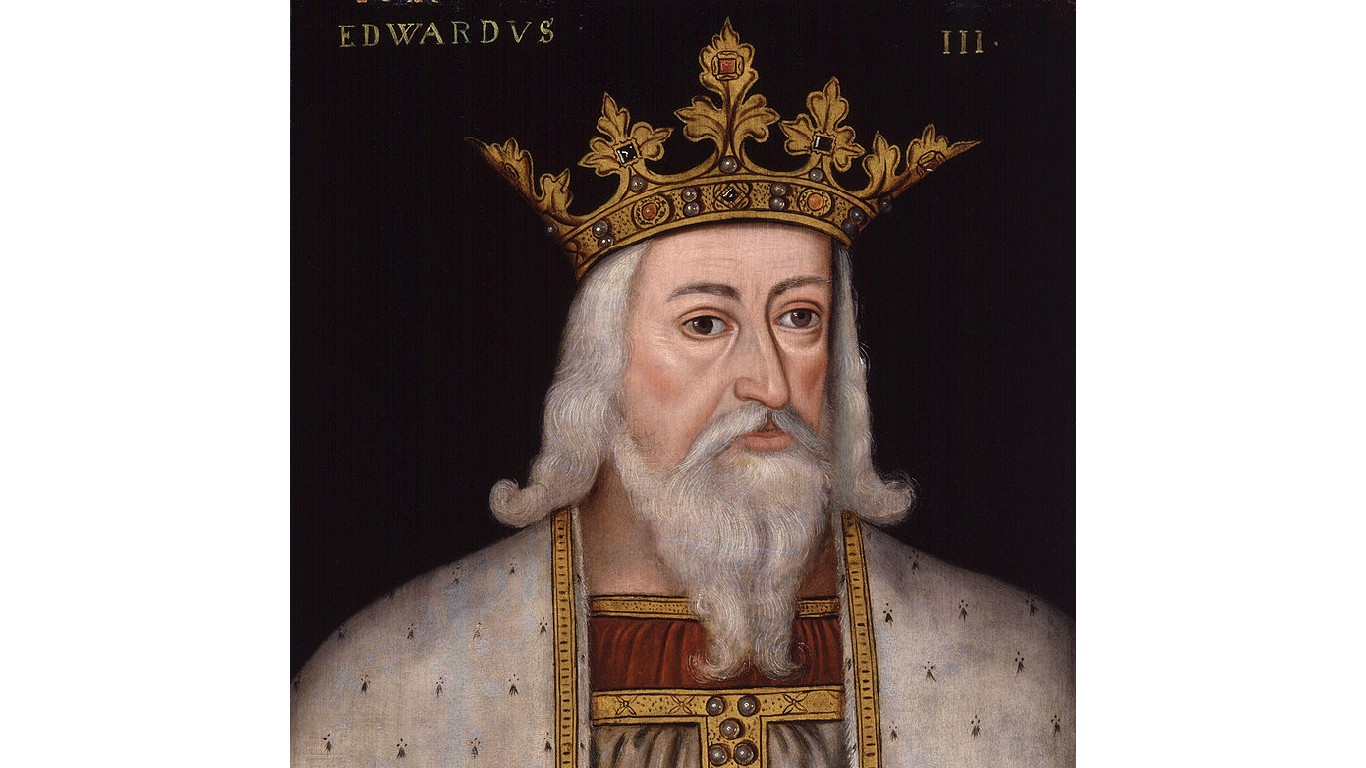
King Edward III
> Nation: England
> Conflict(s) Various
> When: 1332-1346
King Edward III let nothing stand in the way of seizing the English throne, which he held for 50 years. That included his mother’s lover, whom he had executed. His first military triumph came against Scotland at the Battle of Dupplin Moor in 1332, when his forces’ innovative use of the longbow won him victory. He won again, this time against the French, at Sluys in 1340 and most memorably at Crécy in 1346, a battle in which artillery was used in Europe for the first time. He wasn’t present at the Battle of Neville’s Cross against the Scots, also in 1346, but his army won again – a triumph that secured England’s northern border.
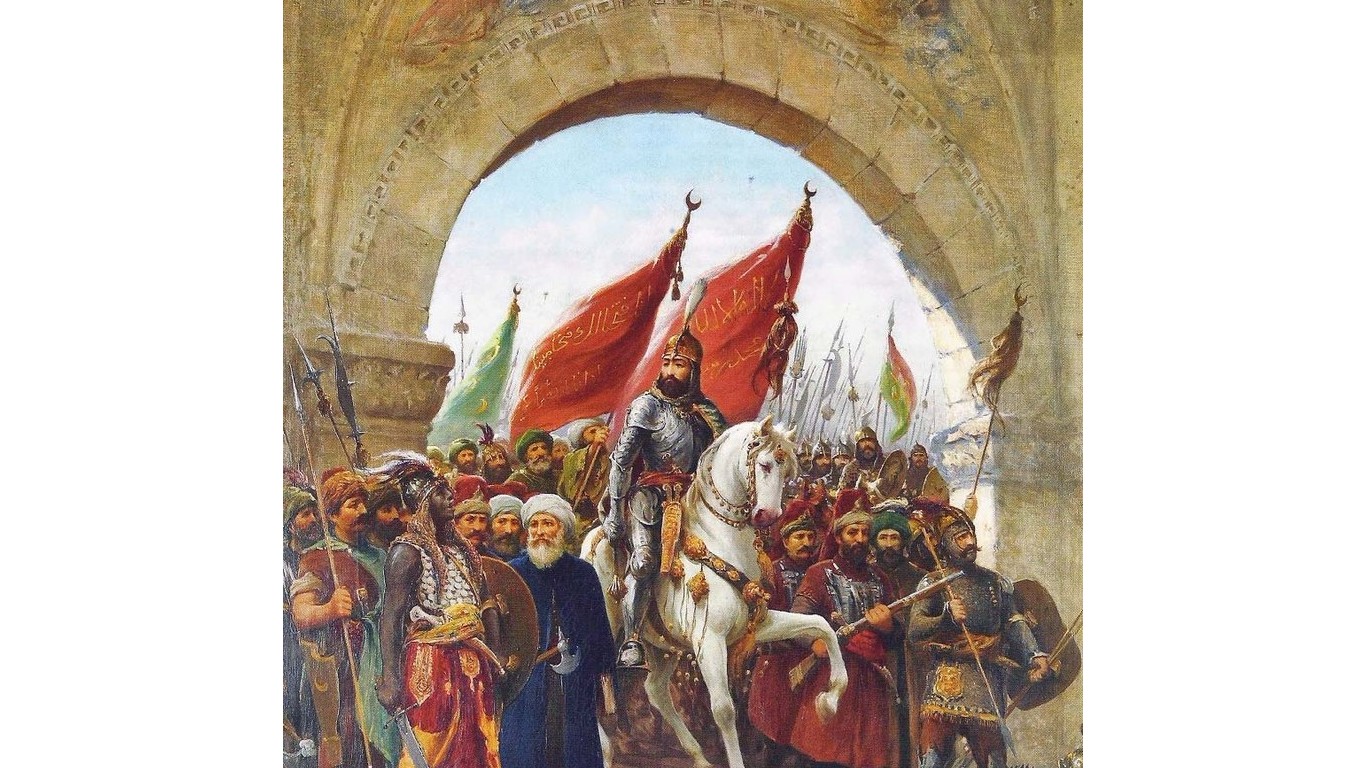
Sultan Mehmed II
> Nation: Ottoman Empire
> Conflict(s) Siege of Constantinople
> When: 1453
Sultan Mehmed II, known as “The Conquerer,” was one of the Ottoman Empire’s greatest monarchs. His conquests in Anatolia and the Balkans consolidated and extended Ottoman rule. His most famous triumph was leading the forces that wrested Constantinople from the Byzantines, marking the end of theirempire and giving the Ottomans dominance over the eastern Mediterranean.

Pharaoh Thutmose III
> Nation: Egypt
> Conflict(s) Various
> When: Mid-15th century B.C.
Egyptian Pharaoh Thutmose III, who was trained in the military arts as a boy and is considered to have been a tactical genius, led at least 16 campaigns – extending the Egyptian empire into Syria, south to Sudan, and into Mesopotamia. In one famous episode, he took a big gamble by taking a shorter but riskier route to suppress a Canaanite insurrection in what is present-day Israel, catching the Canaanites by surprise and ending the rebellion.
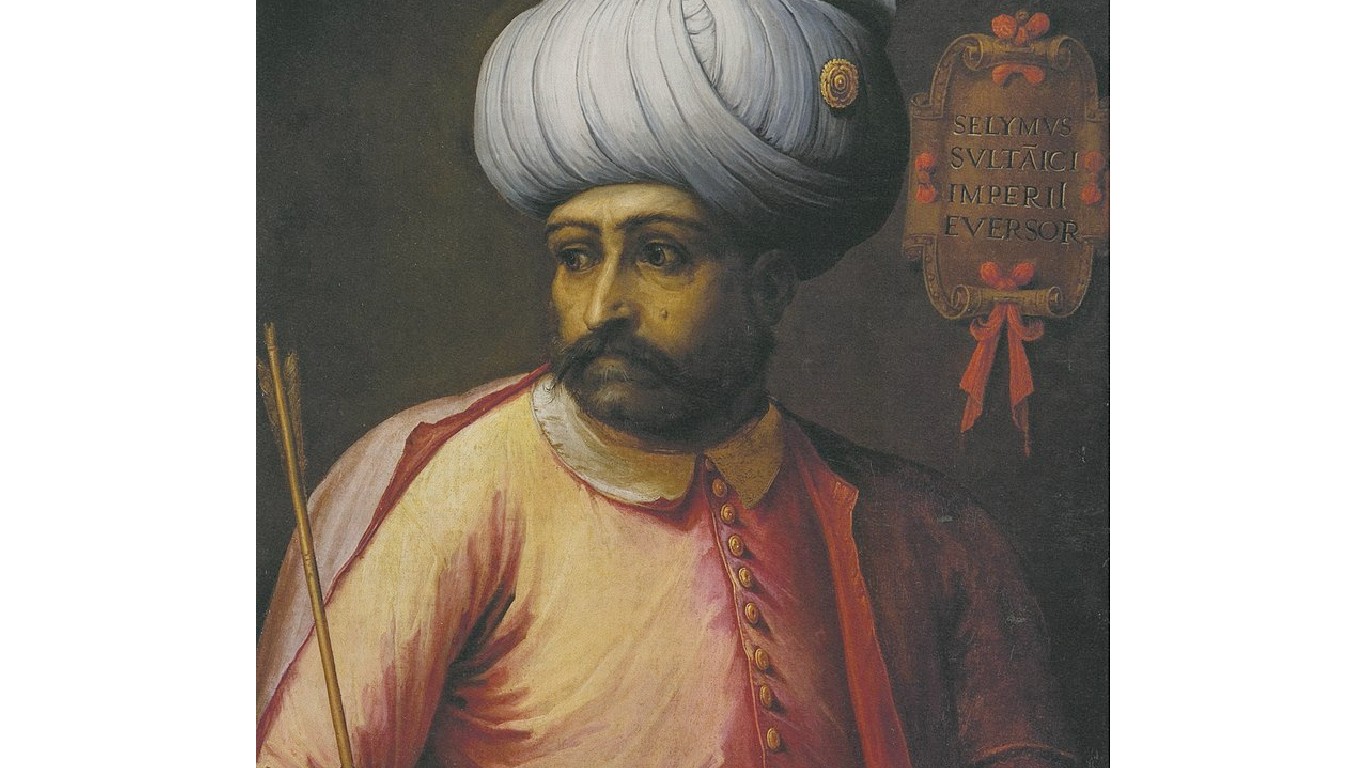
Sultan Selim I
> Nation: Ottoman Empire
> Conflict(s) Various
> When: Early 16th century
Sultan Selim I defeated the armies of the Mamluk rulers of Syria and Egypt, and added those areas and Palestine to Ottoman rule, cementing the position of the Ottoman Empire as leader of the Muslim world. When Selim I went to Cairo, the sharif of Mecca presented him with the keys to Islam’s holiest city, acknowledging the sultan’s preeminence.

Kangxi Emperor
> Nation: China
> Conflict(s) Various
> When: Mid-17th through early 18th centuries
Kangxi is considered to be one of China’s greatest emperors, and the longest-reigning, having ascended the throne at the age of seven. He was known for his knowledge of military tactics and his skill as an archer. One of his armies thwarted the three Chinese vassal kings that challenged his authority in what is known as Revolt of the Three Feudatories between 1683 and 1681, though he didn’t take part in the conflict himself. He did personally lead forces in the First Dzungar-Qing War of 1696 and ’97 in Outer Mongolia, and was responsible for bringing Taiwan into China’s sphere of influence and halting Russian expansion on the country’s northern border.
King John III Sobieski
> Nation: Poland
> Conflict(s) Battle of Vienna
> When: 1683
King John III Sobieski of Poland headed a coalition of European armies that defeated the Ottoman Empire during its second siege of Vienna at Kahlenberg Mountain, near the city. The victory – with Sobieski leading the largest cavalry charge in European history – is considered to be one of the continent’s most significant military verdicts because it halted the Ottoman advance into Europe. Before he became king, Sobieski distinguished himself leading troops in battle against a variety of other foes.

Sultan Mehmed IV
> Nation: Ottoman Empire
> Conflict(s) Various
> When: Late 17th century
Sultan Mehmed IV’s reign was marked by frequent warfare, including campaigns against Austria in 1663 and Poland in 1672 and ’73 (he personally led his forces in the Polish battles). Though he opposed the Ottoman plan to try to conquer Vienna, he marched his army through Hungary to take part in the siege in 1683 – which resulted in an Ottoman rout. Other military setbacks led to Mehmed being deposed in 1687.

King Frederick II
> Nation: Prussia
> Conflict(s) Various
> When: Mid-18th century
Known in history as Frederick the Great, Frederick modernized the Prussian army and created one of the first modern European nation-states. He made war against Austria frequently, starting with the War of Austrian Succession in 1740, shortly after he ascended the throne. What followed was a series of ever-changing European alliances that led to the Seven Years’ War – a worldwide conflict which involved most European nations and nation-states as well as belligerents in Asia and the Americas. The war gave Frederick many opportunities to demonstrate his tactical mastery of the battlefield.
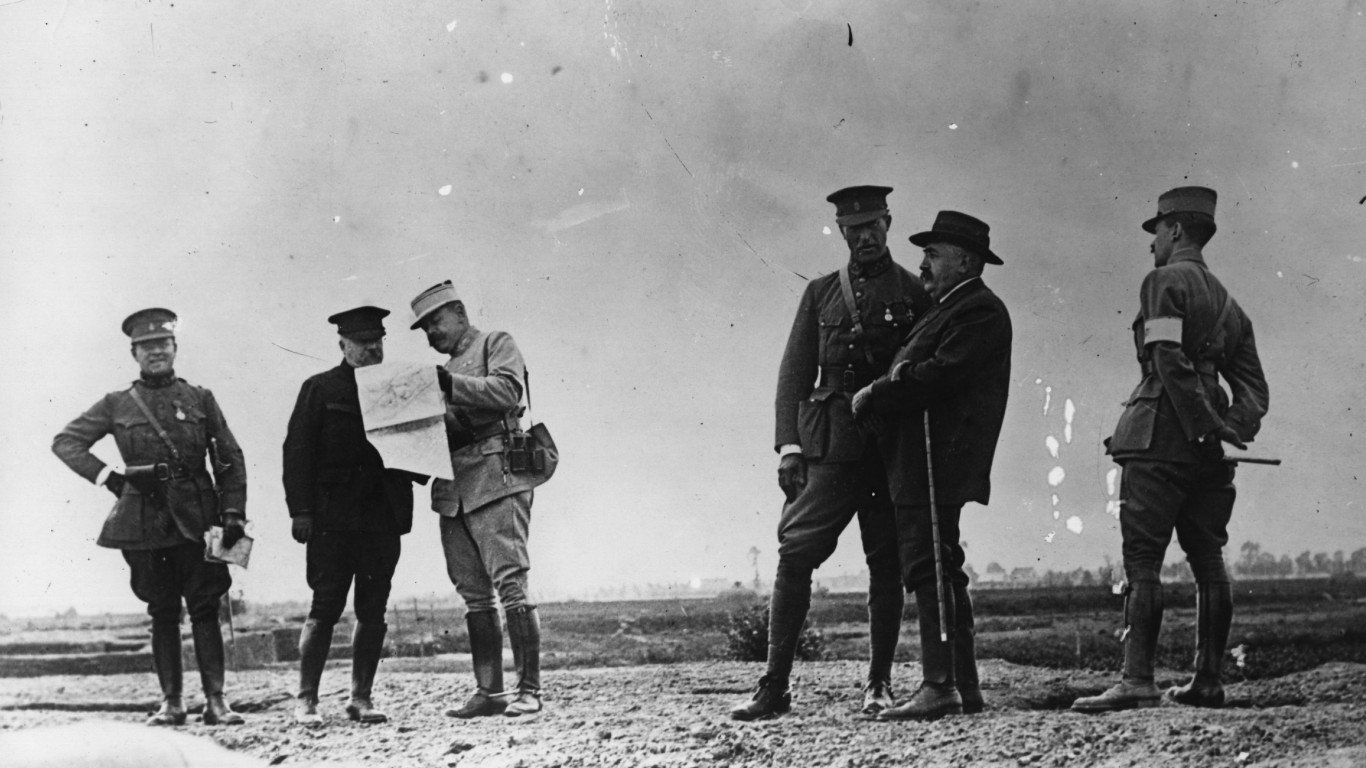
King Albert I
> Nation: Belgium
> Conflict(s) World War I
> When: 1914-1918
King Albert I was a propagandist’s dream – a resolute monarch leading his small country into battle against the mighty German Empire. Albert spent a lot of time on the Western Front, so much so that German troops were forbidden to shoot at him (Albert was a relative of German Kaiser Wilhelm II).
Emperor Trajan
> Nation: Rome
> Conflict(s) Expanded Roman Empire
> When: Late 1st through early 2nd centuries
Trajan was known for his enlightened reign, construction projects, and tolerance for Christianity. He was also a soldier, active in the field before he became emperor. After taking power, he personally conducted military campaigns, mostly in the east, and extended the Roman Empire into the Transylvania region, Arabia, Armenia, and Mesopotamia. Legend has it that when he reached the Persian Gulf, he wept because he was too old to match Alexander the Great’s achievement of reaching India.

Caesar Augustus
> Nation: Rome
> Conflict(s) Various
> When: Late 1st century B.C. through early 1st century
Caesar Augustus, at the time known as Octavian, defeated the rebellious Mark Antony and his ally, the Egyptian queen Cleopatra, in 31 B.C, at the Battle of Actium. He became sole ruler or Rome, and in early 27 B.C. the Senate named him the first Roman emperor, granting him the title of “Augustus,” meaning “the illustrious one.” He established Rome’s first standing army, as well as the Praetorian Guard, a specialized army unit, and under his leadership, Rome annexed Egypt, part of Spain, sections of central Europe, and lands such as Judea in the Middle East. His reign was the start of a nearly 200-year-old period called the Pax Romana, an era of peace.

Emperor Wudi
> Nation: China
> Conflict(s) Various
> When: Mid-2nd through early 1st centuries B.C.
Harsh, demanding, and ruthless, Emperor Wudi, also known as Emperor Wu of Han and the “Martial Emperor,” expanded the Chinese empire in all directions. He began his conquests by attacking the nomadic Xiongnu people, considered to be China’s main threat to the north. His military expeditions brought southern China and northern and central Vietnam into the empire’s fold, and also reconquered northern and central Korea and marched as far west as what is today Uzbekistan. The extent of his personal involvement in these campaigns is unknown.
Emperor Hadrian
> Nation: Rome
> Conflict(s) Various
> When: Early 2nd century
Hadrian had a close relationship with Rome’s legions and led numerous military actions in his pre-imperial days, and had the support of the legions when he became emperor. He was also popular among Rome’s citizens, who enjoyed an extended period of peace under his reign. Hadrian spent much of his time in power outside Rome, administering the empire. This included the construction of the famous wall in England that formed the empire’s northern boundary. He also personally and ruthlessly suppressed a Jewish revolt in Judea in which 580,000 Jews were killed and 1,000 villages razed.

Emperor Marcus Aurelius
> Nation: Rome
> Conflict(s) Marcomannic Wars
> When: 166-180
Marcus Aurelius was a highly educated monarch who embraced the philosophy of stoicism that emphasized reason, fate, and restraint. He jointly reigned with his brother Lucius Aurelius Verus Augustus. Together they battled the Parthian empire for control of territory in the east. They also made war against Germanic tribes that had crossed the Danube River and attacked a Roman settlement, launching the First Marcomannic War (named for one of the tribes, the Marcomanni). After Verus died, Marcus Aurelius continued to lead Roman forces against the Germanic tribes – but after his death in 180, his son and successor, Commodus, negotiated a peace treaty with them.
Emperor Septimius Severus
> Nation: Rome
> Conflict(s) Various
> When: Late 2nd through early 3rd centuries
Few emperors are more closely associated with the Roman military than Septimius Severus, a skilled general of African descent who transformed Rome’s legions. The army grew under Septimius, who offered soldiers higher wages and the right to marry. He eliminated his rivals for the throne – Pescennius Niger, governor of Syria, and other eastern vassals allied with him, and Clodius Albinus, governor of Britain. Severus went into Mesopotamia and defeated the Parthians. He also subdued tribes harassing the Roman frontier in North Africa. Under Severus, the Roman Empire reached its maximum extent, ruling over 3.1 million square miles of territory.
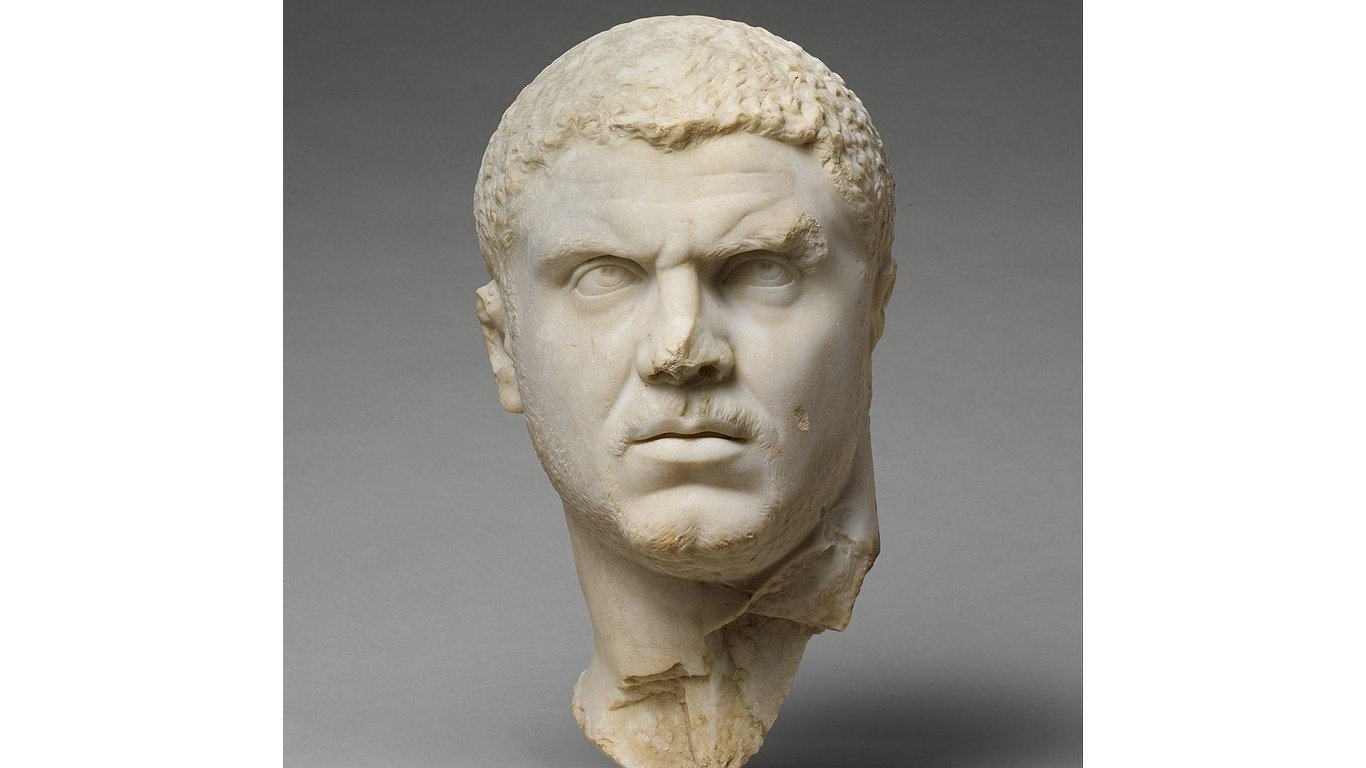
Emperor Caracalla
> Nation: Rome
> Conflict(s) Various
> When: Late 2nd through early 3rd centuries
The unstable Caracalla, son of Septimius Severus, was known for his savagery and erratic behavior. His contemporaries are said to have considered him a soldier first, an emperor second, and he increased army salaries and granted his troops other benefits. He waged war against the Alamanni, a confederation of Germanic tribes, at one point unaccountably massacring a group of German allies, and later launched expeditions against the Parthians in Persia that were largely unsuccessful.
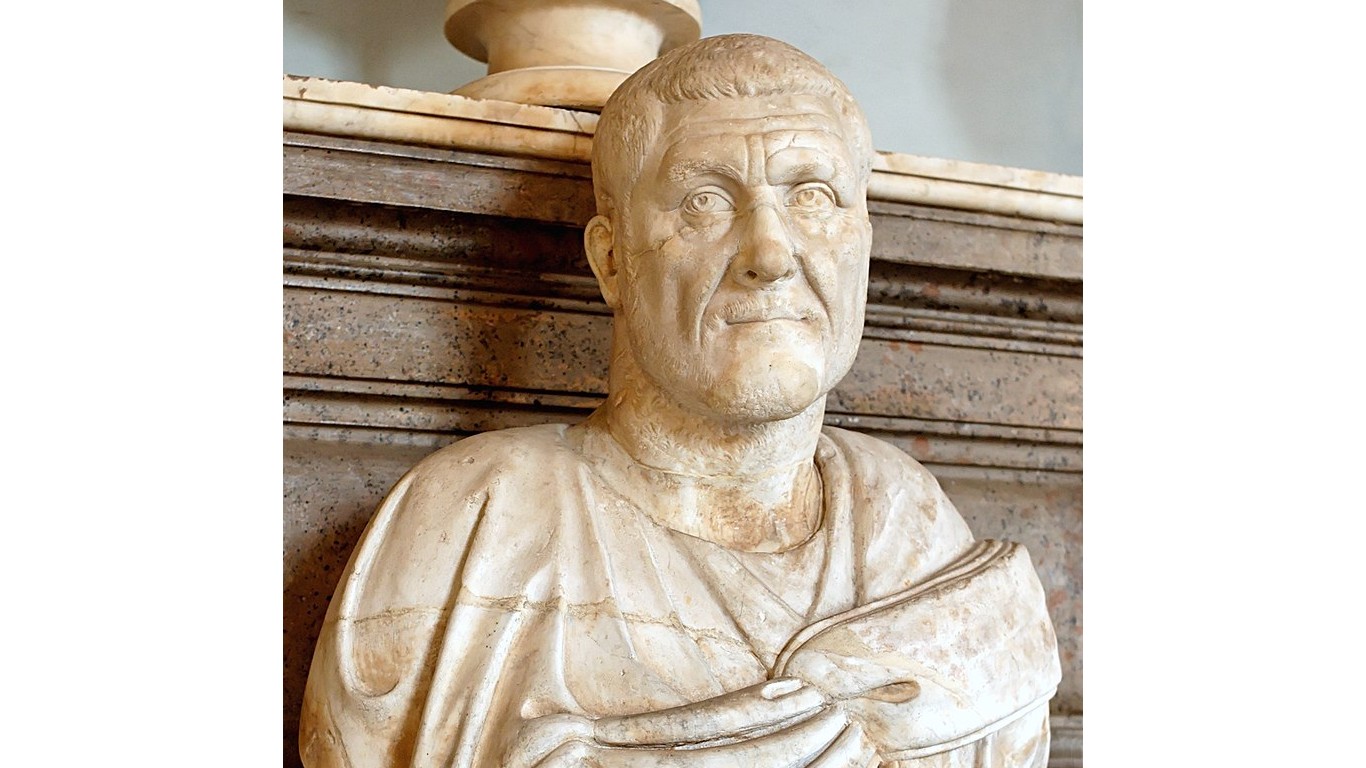
Emperor Maximinus
> Nation: Rome
> Conflict(s) Various
> When: 235-238
Emperor Maximinus, known as Thrax (“the Thracian”) after his birthplace, ruled for just three years. He became emperor after the previous monarch, Alexander Severus, was assassinated for refusing to fight the Germanic tribes, angering the army. A physically imposing man, sometimes described as a “brute,” Maximinus had no qualms about engaging with the tribes. He moved deep into Germany, plundering villages along the way. His troops suffered heavy losses at a battle near Wurttemberg, but he restored peace in the region. Maximinus’s drive into Germany was costly, draining Rome’s finances and harming his reputation among the citizenry.
Emperor Valerian
> Nation: Rome
> Conflict(s) Various
> When: Mid-3rd century
Emperor Valerian, whose ascent to the throne averted a civil war, inherited an empire that was becoming increasingly difficult to rule. Threats came from Goths in the east who sacked Athens during Valerian’s reign. Valerian’s troops marched into Mesopotamia where plague ravaged his troops. He sought a peace treaty with Persia after a devastating defeat at the Battle of Edessa in modern-day Turkey, and planned to meet with the Persian king Shapur. It was a trap. Valerian was taken prisoner – the only Roman emperor ever captured – and became a slave for the rest of his life.

Emperor Qin Shi Huang
> Nation: China
> Conflict(s) Various
> When: Late 3rd century B.C.
The first Chinese ruler to claim the title of emperor, Qin Shi Huang led his army in conquering six warring Chinese states, and built the first centralized empire in Chinese history. He began building the Great Wall, constructed a national road system, and built himself an immense mausoleum, guarded the world-famous life-sized terracotta army, which took 700,000 laborers 39 years to create.

King Philip II
> Nation: Kingdom of Macedonia
> Conflict(s) Various
> When: 359-336 B.C.
Macadeonian King Philip II, father of Alexander the Great, was an accomplished general who learned military strategy as a youth after he was sent as a hostage to the Greek city of Thebes. Among the strategies he employed as general was the concept of the phalanx in which soldiers were formed in a tight, cohesive rectangle and acted as one. He also doubled the size of his infantry and cavalry and gave bonuses to deserving soldiers. Philip led his armies to conquer all of Greece and planned to invade Asia Minor, but was assassinated before he could put his plans into action.

King Alexander the Great
> Nation: Kingdom of Macedonia
> Conflict(s) Various
> When: 334-323 B.C.
Alexander became king of Macedonia at age 20 after his father, Phillip II, was assassinated. After vanquishing internal rivals, Alexander began his campaign of historic conquests in 334 B.C. by invading the Achaemenid Empire in Persia as his father had planned to do. He spent most of his reign leading military campaigns through northeast Africa and southwestern Asia. He built many cities and named some of them, such as Alexandria in Egypt, after himself. He died in Babylon at the age of 32.

King Darius I
> Nation: Persia
> Conflict(s) Various
> When: 552-486 B.C.
Darius I, known as The Great, had to fend off rebellion in Persia’s eastern provinces after he assumed the throne – an ascension laced with intrigue and violence. Considered an excellent soldier, Darius conquered Egypt, the Indus Valley, and Thrace (parts of modern-day Bulgaria, Greece, and Turkey), among other regions. Though he controlled trade routes around Greece, he also felt compelled to conquer Greece itself. A storm scattered his navy off Mount Athos in 492 B.C., and two years later, his soldiers were famously defeated by the Athenians at the Battle of Marathon. A third expedition was planned but a revolt in Egypt delayed the operation and Darius died before it was launched.
King Xerxes I
> Nation: Persia
> Conflict(s) Various
> When: 486-465 B.C.
After quelling revolts in Babylon and Egypt, King Xerxes I led the Persian Empire northwest toward Greece. Historians doubt there was a political or economic reason for Xerxes to wage war, though there is speculation that his close advisers might have reminded the emperor of the humiliation suffered by Persian troops at the hands of the Greeks during the reign of his father, Darius I. Xerxes assembled a massive army that by some modern estimates totaled 360,000 troops and a naval force of up to 800 ships. His navy was defeated at Salamis, however, and his invasion of Greece was thwarted, changing European history forever.

Emperor Taizong of Tang
> Nation: China
> Conflict(s) Various
> When: 626-649
The reign of Emperor Tang Taizong, the second emperor in the Tang Dynasty, is considered as one of the golden ages of China. During his reign, the Chinese empire included present-day China, Mongolia, Vietnam, and extended to modern-day eastern Kazakhstan. He was considered a skilled military leader, with most of his campaigns – many against Turkic peoples in Central Asia, in the far western part of the empire – conducted over a nine-year period ending in 649.

Charlemagne
> Nation: Holy Roman Empire
> Conflict(s) Various
> When: 768-814
A physically imposing warrior-king, Charlemagne was an enlightened ruler and an energetic and militarily astute leader, not to mention the first emperor of what later became known as the Holy Roman Empire. Charlemagne’s military tasks were to defend his realm against external opponents and internal foes; take advantage of changing power relationships; and spread Christianity. It took Charlemagne 30 years to subdue his Saxon enemies. He turned south and seized the Lombard region and became its king. He annexed Bavaria and defeated the Asiatic Avar nomads in eastern Europe. Charlemagne was less successful in trying to expel the Muslims from Spain but did make France’s border with that country more secure.
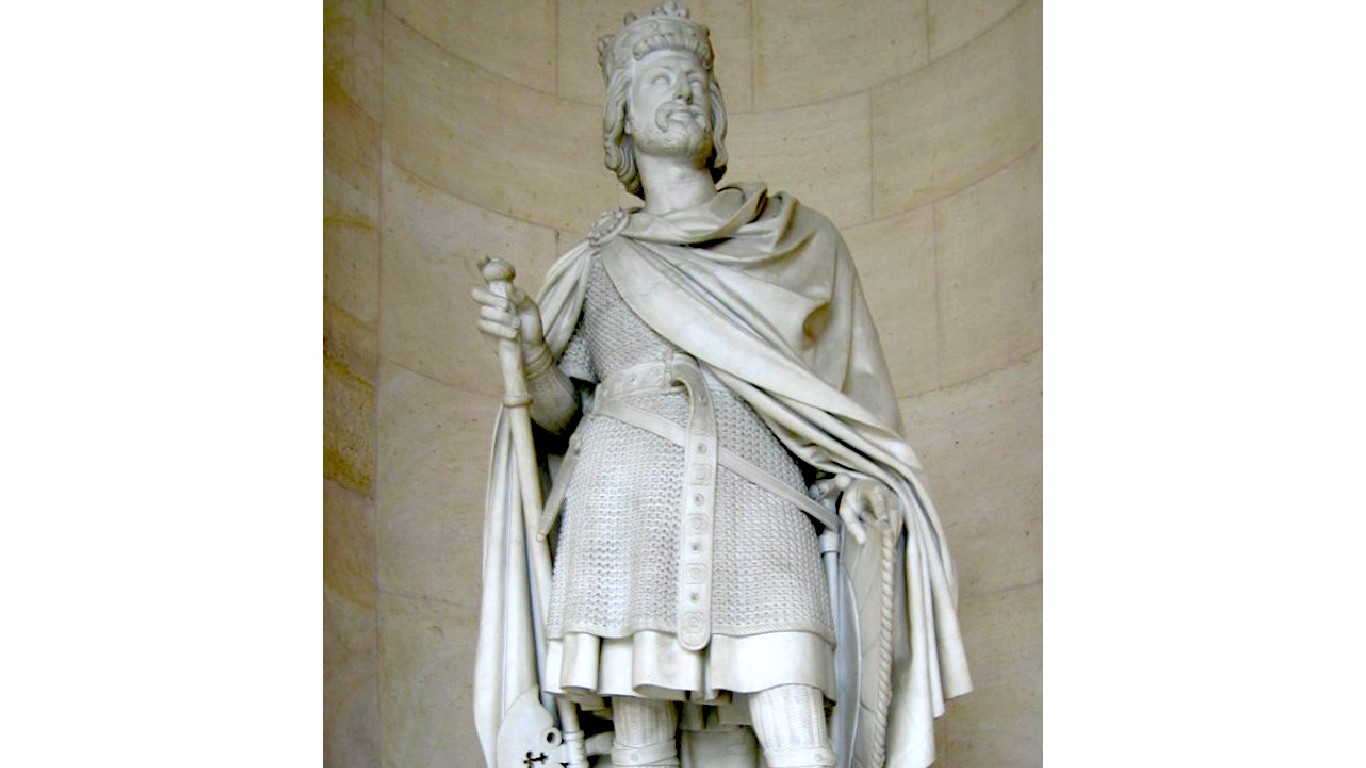
Charles Martel
> Nation: Kingdom of the Franks
> Conflict(s) Various
> When: 718-741
You might remember Charles Martel from your grade-school books as Charles the Hammer. It was a name well-earned. Charles, an illegitimate child of Pepin II, rose in power and eventually gained control of the Frankish kingdom in what is now Belgium, most of France, and parts of Germany. While his most famous victory – the one in the schoolbooks – was the defeat of the invading Moors at the Battle of Tours in 732, he also prevailed in the battles of Ambiève, Vincy, Boarn, and more.
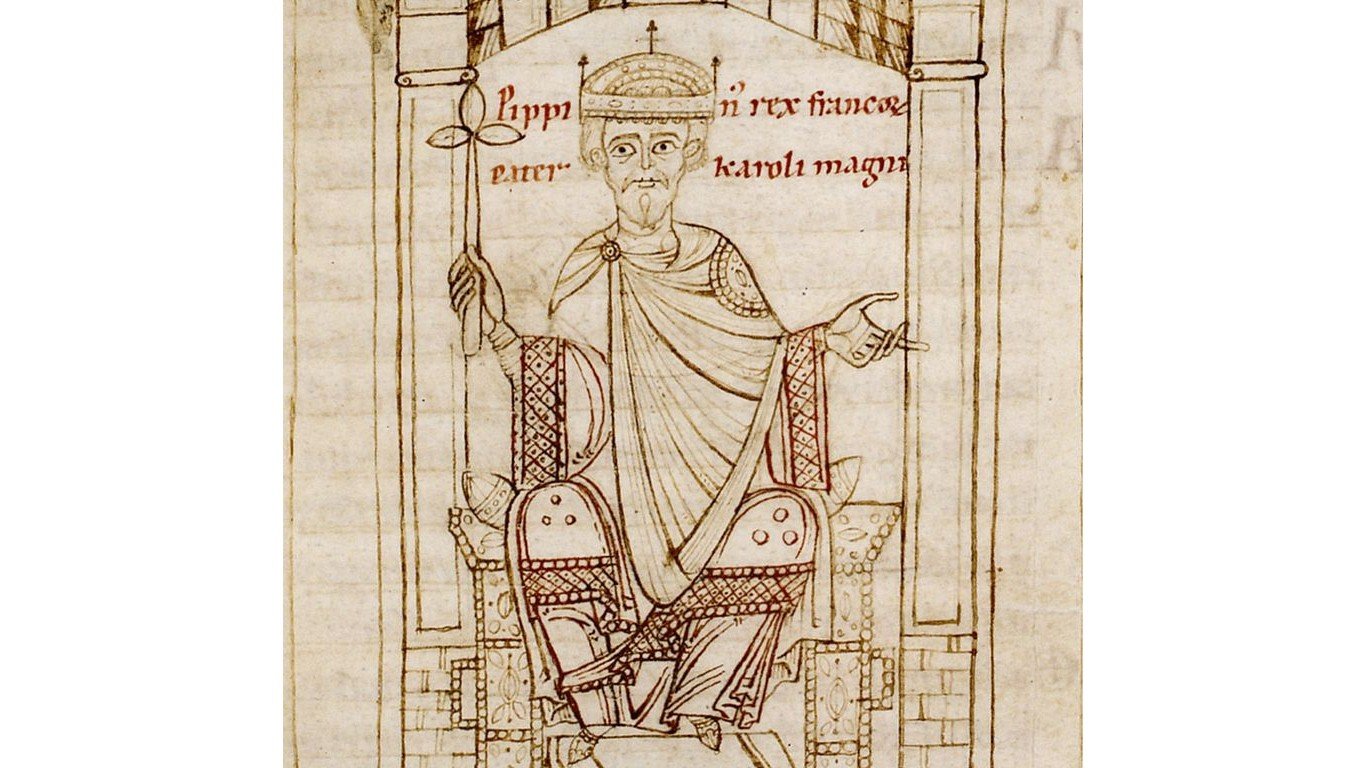
King Pepin the Short
> Nation: Kingdom of the Franks
> Conflict(s) 751-768
> When: 8th century
Pepin, leader of the Franks, son of Charles Martel, and father of Charlemagne, became the first Carolingian king. He accrued power after he was anointed by Pope Stephen II at a ceremony at St. Denis Basilica in Paris. Pepin attacked the Lombards under King Aistulf and forced them to relinquish lands to the Church, thus creating the Papal States. Pepin drove the Saracens out of Gaul and the Moors from Narbonne and over the Pyrenees.

Emperor Napoleon Bonaparte
> Nation: France
> Conflict(s) Napoleonic Wars
> When: 1803-1815
The fact that an era of warfare is named after Emperor Napoleon Bonaparte gives you an idea of how he dominated Europe. These wars, conducted from 1803 until 1815, were conflicts France and its allies fought against various coalitions of nations. Napoleon, known as a tactical genius, was the victor in some of Europe’s largest battles to that point, at Austerlitz and Wagram; saw his army dissolve during a disastrous Russian campaign; and was the loser at Leipzig and most famously, Waterloo.


